
Johnny Cash at San Quentin is the 31st overall album and second live album by American singer-songwriter Johnny Cash, recorded live at San Quentin State Prison on February 24, 1969, and released on June 16 of that same year. The concert was filmed by Granada Television, produced and directed by Michael Darlow. The album was the second in Cash's conceptual series of live prison albums that also included At Folsom Prison (1968), På Österåker (1973), and A Concert Behind Prison Walls (1976).
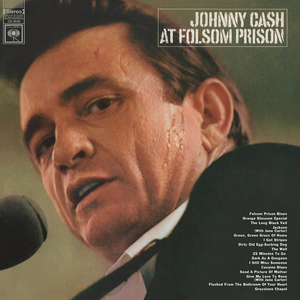
Johnny Cash at Folsom Prison is the first live album by American singer-songwriter Johnny Cash, released on Columbia Records on May 6, 1968. After his 1955 song "Folsom Prison Blues", Cash had been interested in recording a performance at a prison. His idea was put on hold until 1967, when personnel changes at Columbia Records put Bob Johnston in charge of producing Cash's material. Cash had recently controlled his drug abuse problems, and was looking to turn his career around after several years of limited commercial success. Backed by June Carter, Carl Perkins, and the Tennessee Three, Cash performed two shows at Folsom State Prison in California on January 13, 1968. The initial release of the album consists of 15 songs from the first show and two from the second.

Class of '55: Memphis Rock & Roll Homecoming is a collaborative studio album by Carl Perkins, Jerry Lee Lewis, Roy Orbison, and Johnny Cash. It was released on May 26, 1986, by America/Smash Records, a subsidiary of Polygram Records. The album was produced by Chips Moman.
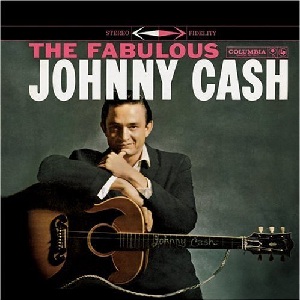
The Fabulous Johnny Cash is the second studio album by American country singer Johnny Cash and his first to be released by Columbia Records. The album was released on November 3, 1958, not long after Cash's departure from Sun Records.

Unearthed is a box set by American country singer Johnny Cash. It was released by American Recordings on November 25, 2003, two months after Cash's death. The album was compiled by Cash and Rick Rubin, who also produced the set. It was certified Gold on December 2, 2004, by the Recording Industry Association of America.

Sings Hank Williams is a compilation album by American singer-songwriter Johnny Cash. It was released on September 5, 1960, by Sun Records after Cash had left the label and signed with Columbia Records. Despite the title, the album does not exclusively cover Hank Williams material, but is also made up of songs that Cash recorded for Sun prior to leaving the label. The album was re-issued in 2003 by Varèse Sarabande with five bonus tracks, two of them being alternate recordings of songs already available on the album.

Bitter Tears: Ballads of the American Indian is a 1964 concept album, the twentieth album released by singer Johnny Cash on Columbia Records. It is one of several Americana records by Cash. This one focuses on the history of Native Americans in the United States and their problems. Cash believed that his ancestry included Cherokee, which partly inspired his work on this recording. The songs in this album address the harsh and unfair treatment of the indigenous peoples of North America by Europeans in the United States. Two deal with 20th-century issues affecting the Seneca and Pima peoples. It was considered controversial and was rejected by some radio stations and fans.

Orange Blossom Special is the 21st album released by musician Johnny Cash on Columbia Records in 1965. The recordings include country and folk standards, such as "The Long Black Veil", "When It's Springtime in Alaska", "Danny Boy" and "Wildwood Flower".

Johnny Cash Sings the Ballads of the True West is a concept double album and the 22nd overall album released by country singer Johnny Cash, released on Columbia Records in 1965. Covering twenty individual songs, the album, as its title suggests, contains various ballads and other songs on topics related to the history of the American Old West. This includes Carl Perkins' "The Ballad of Boot Hill", "Streets of Laredo", and the sole single from the album, "Mr. Garfield", describing the shock of the population after the assassination of President James Garfield. One of the songs, "25 Minutes to Go", would later be performed at Folsom Prison and appear on Cash's famous At Folsom Prison recording in 1968, while the melody of "Streets of Laredo" would be recycled for the song "The Walls of a Prison" featured on Cash's album From Sea to Shining Sea.
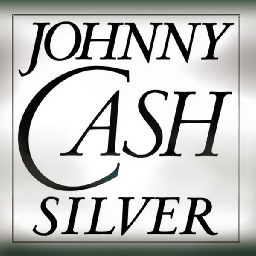
Silver is the 25th anniversary studio album by American country singer Johnny Cash and his 62nd album overall, released on Columbia Records in 1979. It peaked at #28 on the Billboard albums chart. "(Ghost) Riders in the Sky" peaked at #2 on the singles chart; the two other singles, "Bull Rider" and "I'll Say It's True", had reached #66 and #42, respectively. Recordings of "Cocaine Blues" had previously appeared on At Folsom Prison and Now, There Was a Song!, under the title "Transfusion Blues" on the latter. The album was produced by Brian Ahern, who controversially introduced digital elements into the songs to the disapproval of some listeners. This is the last album that featured bassist Marshall Grant, longtime Cash collaborator in Tennessee Two. He departed from Cash's band the following year.
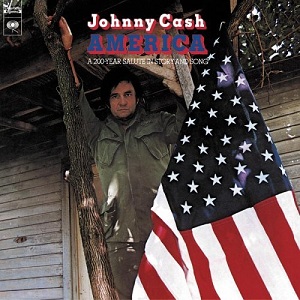
America: A 200-Year Salute in Story and Song is a concept album and the 40th overall album by country singer Johnny Cash, released on Columbia Records in 1972. As its title suggests, it comprises a number of tracks dedicated to the topic of American history, like several of Cash's other Americana albums. The record is a mix of songs and narration, in which Cash attempts to describe elements of the country's past, including famous personalities like Paul Revere or Big Foot. America also includes a re-recording of "Mr. Garfield" and "The Road to Kaintuck", songs previously released as singles in 1965 on Sings the Ballads of the True West. Most of the tracks on the album were written by Cash, with some exceptions, including a rendition of the well-known song "The Battle of New Orleans" and a reading of Abraham Lincoln's famous Gettysburg Address. The album was included on the Bear Family box set Come Along and Ride This Train.

Johnny Cash på Österåker is a live album by country singer Johnny Cash released on Columbia Records in 1973, making it his 43rd overall release. The album features Cash's concert at the Österåker Prison in Sweden held on October 3, 1972. Its counterparts in concept are the more notable At Folsom Prison (1968), At San Quentin (1969), and A Concert Behind Prison Walls (1976). Unlike aforementioned, På Österåker does not contain any of Cash's most well-known songs; it does, however, include a version of Kris Kristofferson's "Me and Bobby McGee". "Orleans Parish Prison" was released as a single, faring rather poorly on the charts. Cash had previously recorded "I Saw a Man" for his 1959 album, Hymns by Johnny Cash.

Strawberry Cake is a live album and 53rd overall album by American singer Johnny Cash, released on Columbia Records in 1976. The album includes numerous pieces of between-song stage banter. The album includes several of Cash's most well-known early songs, such as "Big River", "I Still Miss Someone" and "Rock Island Line", as well as a number of more obscure compositions, some of which were performed by Cash for the first time; this includes "Strawberry Cake" and "Navajo". The title track was released as a single, but did poorly on the charts, peaking at No. 54.

The Johnny Cash Children's Album is the 49th album by country singer Johnny Cash, released on Columbia Records in 1975 featuring recordings made between January 1972 and October 1973. As the title implies, it contains songs written for children. Among others, this includes "Tiger Whitehead", a song later released in an acoustic version on Cash's posthumous Personal File album in 2006. Most of the songs on the album had not been performed by Cash before. "Old Shep" had been performed by Elvis Presley, among others. One track recorded in 1972 was previously released on LP: "I Got a Boy " was first made available on the 1972 album International Superstar. It is a tongue-in-cheek duet between Cash and his wife, June Carter Cash, about their son, John Carter Cash.

The Unissued Johnny Cash is a compilation album and 59th overall album by American country singer Johnny Cash, released on Bear Family Records in 1978. It is tailored to completist fans of Cash as it consists entirely of rare or unreleased material from Cash's early Columbia days. The first four tracks, all recorded in August, 1958, are outtakes from The Fabulous Johnny Cash, and also appear on the CD re-release of that album. Likewise, the outtake "The Fable of Willie Brown" appears on the re-release of Ride This Train. The Carter Family song "I'll Be All Smiles Tonight" is an outtake from Blood Sweat and Tears.
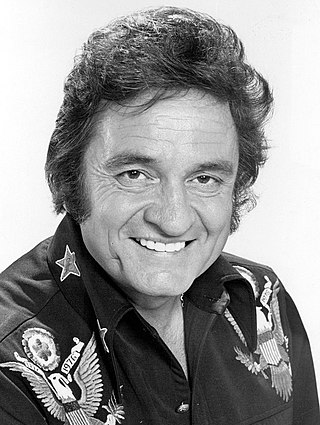
John R. Cash was an American country singer-songwriter. Most of Cash's music contains themes of sorrow, moral tribulation, and redemption, especially songs from the later stages of his career. He was known for his deep, calm bass-baritone voice, the distinctive sound of his Tennessee Three backing band characterized by train-like chugging guitar rhythms, a rebelliousness coupled with an increasingly somber and humble demeanor, free prison concerts, and a trademark all-black stage wardrobe, which earned him the nickname the "Man in Black".

"Hey, Porter" is a song by Johnny Cash. It was recorded on September 1, 1954 and released as a single in May the following year. It tells the story of a train journey home to Tennessee, from the point of view of a very excited passenger that continually asks the porter for updates.

Country Christmas is the fourth Christmas album and 78th overall album by American country singer Johnny Cash, released on Laserlight Digital in 1991, in-between Cash's contracts with Mercury Records and American Recordings.

Ride This Train is the sixth album by American country singer-songwriter Johnny Cash. It was originally released on August 1, 1960 and was re-issued on March 19, 2002, containing four additional bonus tracks.
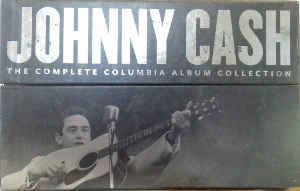
The Complete Columbia Album Collection is a box set by country singer Johnny Cash, released posthumously in 2012 on Columbia Records and Legacy Recordings.




















